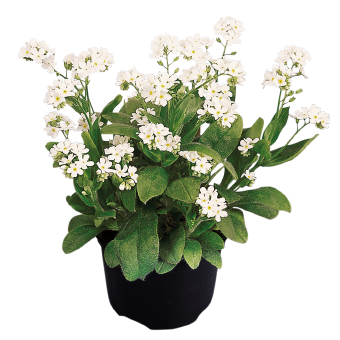

Sylva Snow
Item no.: MS0103R- Profilic and compact bloomer with intense colors
- Crop Time
- Spring: 24 weeks
- Height ∅
- 8 ″ / 20 cm
- Exposure
- Sun - Partial shade
- Seed Form
- Raw Seed
- Hardiness Zone
- 5a-8a
- Best Uses
- Bedding, Pot Plant
Culture guide
Usage
Plants for landscape and borders, pot plants
Sow time
Outdoors forcing: Mid June-End August, depending on ambient conditions; Indoor forcing: February-March for green pots, Indoor forcing: mid August-early September for flowering in pots following year
Sowing method
1-2 seeds per plug, can be sown directly into final pot (3-5 seeds)
Germination
Germinates in 10-20 days at 65-72 °F (18-22 °C). Light is required for germination.
Growing on
Transplant plugs after 4-5 weeks. Grow on at 48-54 °F (9-12 °C) night temperature to induce flowering for fall and spring production. Vernalization is required for flower initiation. After vernalization, begin forcing plants at 60-65 °F (15-18 °C) for 5-7 weeks.
Media
Use a well-drained, growing substrate with 20-30 % clay, 1 kg/m³ complete balanced fertilizer, 0,5-1 kg/m³ slow release fertilizer (3-6 months), iron-chelate, micronutrients, pH: 6.0-7.0.
Temperature
Grow at 12-15 °C or outdoors. In winter indoors frost free at 3-5 °C. In January the plants start to grow for 3-5 weeks at 7-13 °C. Grow as cool as possible, but avoid freezing temperatures for a good plant quality. At warm temperatures open airing in time.
Fertilization
Moderate fertilization levels are required. Fertilize the crop weekly with 100-150 ppm nitrogen (at 0 kg/m³ slow release fertilizer in substrate), using a potassium balanced fertilizer (N: K₂O-ratio: 1:1,5). The plants take up the minerals at 5 °C. Avoid high ammonium and high nitrogen levels. Don’t fertilize after early October. In spring fertilize 150-200 ppm nitrogen of a complete balanced fertilizer. Prevent magnesium deficiency by applying magnesium sulphate (0,025 %) 1-2 times and in case of Iron deficiency apply iron-chelate for 1-2 times. Temperatures below 10 °C inhibit the iron uptake. Therefore take care of, that the temperature is above 10°C for iron fertilization.
Stage I Starts with the radicle breaking through the testa. The roots are touching the medium. Ends with fully developed cotyledons.
Stage II Starts from fully developed cotyledons. Ends with the fully developed true leaf or true leaf pair.
Stage III Starts from the fully developed true leaf or true leaf pair and ends with 80% of the young plants being marketable.
Stage IV All young plants are ready for sale and in the process of being hardened off. This stage lasts about 7 days.
The cultural recommendations are based on results from trials conducted under Central European conditions. Different conditions in other parts of the world may lead to deviations in results achieved.



